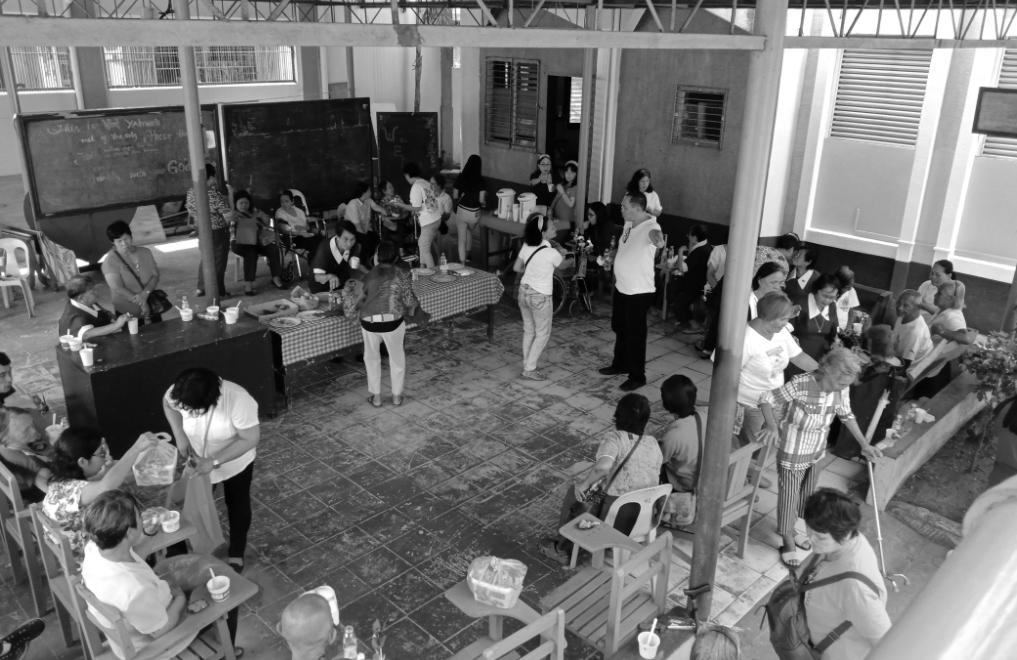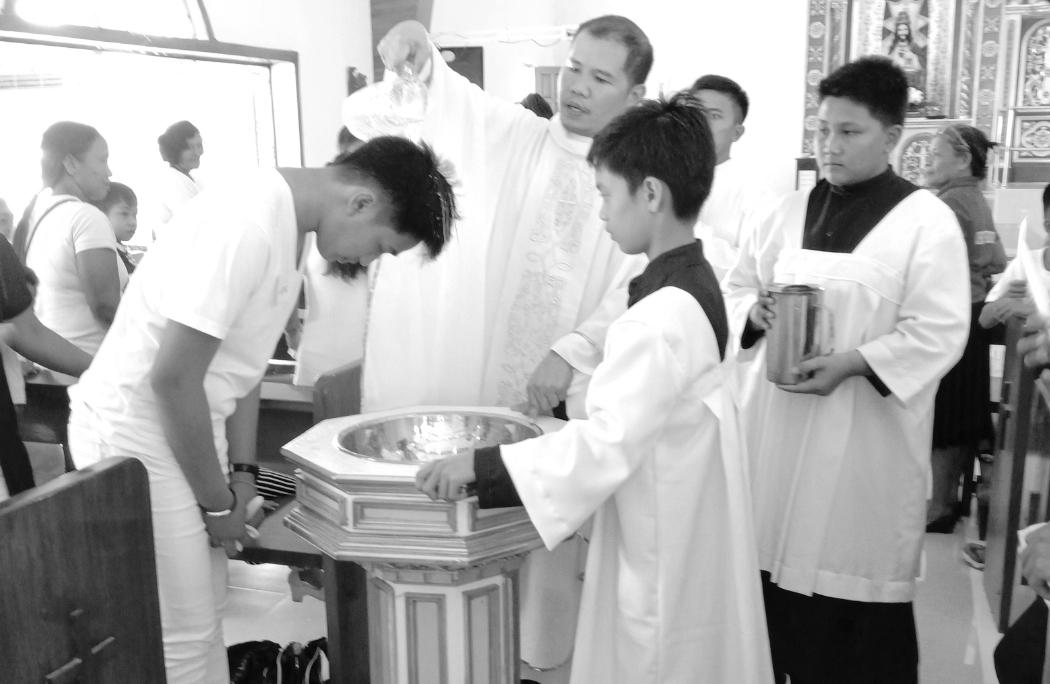
9 minute read
Catechetical Lesson 4 – Mission: Sent By The Father
CATECHETICAL LESSON 4:
MISSION: SENT BY THE FATHER
Advertisement
Introduction
At the very moment when by Jesus´ death, He conquers death so that raised from the dead by the glory of the Father, He might immediately give the Holy Spirit by breathing on His disciples. From that hour onward, the mission of Christ and the Holy Spirit becomes the mission of the Church (CCC 730).
Christ founded His Church to continue His saving mission on earth. “The Church, endowed with the gifts of her founder, receives the mission to proclaim and to establish among all peoples the Kingdom of Christ and of God” (LG 5). This ‘mission’ is built into her very nature as originating from the Blessed Trinity. The mission flows from the Church as a “Sacrament of salvation,” the sign and instrument for achieving intimate union with God (cf. AG 5; LG 1; CFC 1412). Thus, the Church has a mission mandate (cf. Mt 28:19): whose origin and goal is the Blessed Trinity (cf. AG 2); motivated by God’s love (cf. 2 Cor 5:14); and with the Holy Spirit as its Principal Agent (cf CCC 849-56).
The mission of Christ and of the Holy Spirit is brought to completion in the Church, which is the Body of Christ and the Temple of the Holy Spirit. This joint mission brings Christ’s faithful to share in His communion with the Father and the Holy Spirit. The Lord's missionary mandate is ultimately grounded in the eternal love of the Most Holy Trinity: “the Church on earth is by her nature missionary since, according to the plan of the Father, she has as her origin the mission of the Son and the Holy Spirit” (AG 2).
The ultimate purpose of mission is none other than to make men share in the communion between the Father and the Son in their Spirit of love (CCC 850). It is from God's love that the Church in every age receives both the obligation and the vigor of her missionary dynamism, indeed, God desires all men to be saved and to come to the knowledge of the truth ( 1Tim 2:4). That is, God wills the salvation of everyone through the knowledge of the truth. Thus, salvation is founded on the truth (CCC 851).
Jesus said to them again, “Peace be with you. As the Father has sent me, so I send you.”(Jn 20, 21)
Photo from Diocese of Kidapawan
This missionary endeavor requires patience. It begins with the proclamation of the Gospel to people and groups who do not yet believe in Christ, continues with the establishment of Christian communities that are a sign of God's presence in the world and leads to the foundation of local churches. It must also stimulate efforts towards Christian unity that implies a respectful dialogue with those who have not yet accepted the Gospel for the glory of God, which are the confusion of the demon and the happiness of man (AG 9).
Word of God
Gospel of John 20:19-23
When it was evening on that day, the first day of the week, and the doors of the house where the disciples had met were locked for fear of the Jews, Jesus came and stood among them and said, “Peace be with you.”
20
After He said this, He showed them His hands and His side. Then the disciples rejoiced when they saw the Lord. be with you. As the Father has sent Me, so I send you.”
22 21
Jesus said to them again, “Peace When He had said this, He breathed
on them and said to them, “Receive the Holy Spirit.
23
If you forgive the sins of any, they are forgiven them; if you retain the sins of any, they are retained.”
Doctrine
The Mission of the Son and of the Holy Spirit
† Joint Mission of Christ and the Spirit: CCC 1299 - So closely do Christ and the
Spirit work together that we can rightfully speak of the “joint mission of the Son and of the Spirit” (CCC 689, 702, 727). When the Father sends His Word, He always sends His Breath. From there occurs a joint mission in which the Son and the Holy
Spirit are distinct but inseparable. Christ appears as the visible Image of the invisible
God, but the Holy Spirit reveals Him. The knowledge of the “mysteries of the Reign of
God” of which Christ is the fullness, is “given” (Mt 13:11) in the gift of the Holy Spirit (CCC 729). Christ gives the form and content of salvation, while the Spirit makes present and extends this new life.
The Church in God´s plan: Origin and her Mission
† Nature of The Church: CFC 1355 - The Church can be shown first from its long history. Our Catholic Church traces its origin back to the Old Testament qahal and the
New Testament ekklesia (CCC 751f). Both terms mean “the people of God called together,” or an “assembly convoked by God.” Thus, the Church stresses the action of God in calling the people together. The Church claims to be a faith-assembly whose root cause is God’s free call to all to share His Divine goodness and love in
Christ. Therefore, the church is not just a social group of people drawn together by cultural values and attitudes. The Church upholds the faith-conviction that God is the ever-present source and ground for the Church and He is the reason for explaining the Church as “mystery” and “sacrament.”
† CFC 1357 - The Church is related to each Person of the Blessed Trinity. First, to the eternal Father who “resolved to assemble all those who believe in Christ in the holy Church.” In the Father’s plan, the Church was: † prefigured from the beginning of the world; † prepared wonderfully in the history of Israel, † instituted finally in these last times, † manifested in the outpouring of the Holy Spirit, † to be brought to completion at the end of time (LG 2; CCC 760-69).
† CFC 1366 - The Church as mystery is further clarified and developed by the notion of sacrament. “By her relationship with Christ, the Church is both a sacramental sign and an instrument of intimate union with God, and of the unity of all mankind” (GS 42;
LG 1). Christ then has made the Church the effective sign and symbol of: 1) our union with God; 2) the unity among men; and 3) of salvation.
† CFC 1454 - What are the essential characteristics of the Church? Traditionally the
Church has been described by four basic characteristics, each of which as both gift and task relates the Church directly to Christ. These characteristics are: ONE, HOLY,
CATHOLIC, and APOSTOLIC.
Faith Response
† To have the conviction that the Catholic Church is the True Church of Christ † To have the conviction that the Church received and has her origin from God, the mission of the Son and of the Spirit. † To be loyal to the Doctrine taught by the Church. † To work with diligence and patience as member of the Church and as missionary of
God.

Photo from Diocese of Capiz
Human Values/Virtues
† Truthfulness - truth as uprightness in human action and speech (CCC 2468). This virtue consists in showing oneself true in deeds and truthful in words and in guarding against duplicity, dissimulation and hypocrisy (YOUCAT 452-457).
† Patience - the capacity to accept or tolerate delay, trouble, or suffering without getting angry or upset.
† Loyalty - giving or showing firm and constant support or allegiance to a person or institution.
† Obedience - it requires all to give due honor to authority and to treat those who are charged to exercise it with respect insofar as it is deserved with gratitude and good will (CCC 1900).
Morals
† Live in and with the Church, that is in accordance to the moral teachings of the
Church and pray for the missions and missionaries
† Act and be aware of the responsibilities as a member of the Catholic Church
† Unite oneself to the mission of the Church as an active member, be an apostle of
Christ!
† Watch a film about the life of a saint, especially the patron saints of missionaries, like
St. Teresa of the Child Jesus, or St. Francis Javier
Simple Activities
Song Analysis: Here I Am Lord (See next page)
Guide for reflection:
† Am I doing a mission in my own community or parish? † Am I open to the possible opportunity to do a mission, as a lay faithful or religious or priest? † What is God telling me to do for his Church?
Photo from Diocese of Borongan
Here I Am Lord
by Misc Praise Songs
I, the Lord of sea and sky, I have heard my people cry. All who dwell in dark and sin, My hand will save. I, who made the stars of night, I will make their darkness bright. Who will bear my light to them? Whom shall I send?
[Chorus] Here I am, Lord. Is it I, Lord? I have heard you calling in the night. I will go, Lord, if you lead me. I will hold your people in my heart.
[Verse 2] I, the Lord of snow and rain, I have borne my people’s pain. I have wept for love of them. they turn away. I will break their hearts of stone, Give them hearts for love alone. I will speak my words to them. Whom shall I send?
[Verse 3] I, the Lord of wind and flame, I will send the poor and lame. I will set a feast for them. My hand will save. Finest bread I will provide, 'Til their hearts be satisfied. I will give my life to them. Whom shall I send?
Worship
Zeal for Mission
Prayer for the Missions
O God, who would have all Your children saved and come to the knowledge of the truth, send forth, we beseech You, laborers into Your harvest and grant them all confidence to preach the Word. That through their preaching everywhere, Your Gospel may be heard and glorified, and that all nations may know You, the One True God, and Him whom You have sent, Jesus Christ, Your Son, our Lord. Amen.
Queen of the Apostles and all you angels and saints of God, we pray to the Lord of the harvest that He may send laborers into the yield and spare His people. May we all rejoice with Him, the Father, and the Holy Spirit forever and ever. Amen.
† UNDERSTAND – To participate in the different activities of the parish or of the community † LIVE – To pray for the missions of the Church and for the intentions and safety of missionaries † SHARE – To be a missionary to your family and friends by doing little things that help them know, love and praise God










